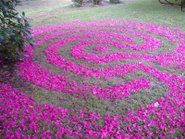 Just something a little cuter to look at than flat worms. I usually go for more abstract stuff, but the woodland glade I made half a dozen of these little chaps in just cried out for pixies.
Just something a little cuter to look at than flat worms. I usually go for more abstract stuff, but the woodland glade I made half a dozen of these little chaps in just cried out for pixies.Wednesday, 6 June 2007
wood pixies
 Just something a little cuter to look at than flat worms. I usually go for more abstract stuff, but the woodland glade I made half a dozen of these little chaps in just cried out for pixies.
Just something a little cuter to look at than flat worms. I usually go for more abstract stuff, but the woodland glade I made half a dozen of these little chaps in just cried out for pixies.Monday, 4 June 2007
unwelcome visitors

Yuck, I've got Australian Flatworms (Australoplana Sanguinea) in my garden. I found the first two early this spring, but apparently they've been reported from this post code several times before.
These ugly, non indigenous little horrors prey on earthworms. They've no natural predators and are covered in an irritant slime, so as far as I can tell have no redeeming features.
The only way to control numbers is to trap and kill them. They like to hide under heavy plastic things in the day time so look under planters, bags of compost or water butts. You can read all about them and their New Zealand cousins here.
permaculture- can ya tell what it is yet?
It's probably down to the Australian connection, but this post started when the question above popped into my head in a distinct Rolf Harris accent. (Remember those big paintings where he drew a few squiggles in one corner, some crosses and squares in the middle, stood back,asked "Can you tell what it is yet?" and with a final couple of dots and strokes the whole New York skyline appeared).
So I've spent a fair bit of time over the weekend looking for a snappy, succinct definition of permaculture. There's the original Bill Mollison one liner
"Permaculture is a design system for creating sustainable human environments"
which I found with a load of other definitions here. And I quite liked
"Permaculture is a way of thinking that gives you the tools to create sustainable systems - in all areas of human endeavour."
from eco-logic books, though it does run to two lines. In fact most explanations of permaculture end up pretty wordy, because , like one of Rolf's paintings, you need to fill in quite a lot of details before the whole picture emerges.
Rather then try to reinvent the wheel with my own introduction, here are some interesting links
You can start with the ethics or core values - Earth Care, People Care and Fair Shares.
Then you need the principles. There are quite a few of them (about 12) and they vary a bit in how they're stated. there's a good list of them here http://www.spiralseed.co.uk/permaculture/ or
here
http://www.aranyagardens.co.uk/Permaculture.htm
http://www.permaculture-info.co.uk/ is a good place to start, with an introduction and some good "design bites"
Off the links on its home page you'll find http://www.permaculture-magazine.co.uk/. A peruse of the articles will start to show the scope of ideas that fall under the permaculture label.
So I've spent a fair bit of time over the weekend looking for a snappy, succinct definition of permaculture. There's the original Bill Mollison one liner
"Permaculture is a design system for creating sustainable human environments"
which I found with a load of other definitions here. And I quite liked
"Permaculture is a way of thinking that gives you the tools to create sustainable systems - in all areas of human endeavour."
from eco-logic books, though it does run to two lines. In fact most explanations of permaculture end up pretty wordy, because , like one of Rolf's paintings, you need to fill in quite a lot of details before the whole picture emerges.
Rather then try to reinvent the wheel with my own introduction, here are some interesting links
You can start with the ethics or core values - Earth Care, People Care and Fair Shares.
Then you need the principles. There are quite a few of them (about 12) and they vary a bit in how they're stated. there's a good list of them here http://www.spiralseed.co.uk/permaculture/ or
here
http://www.aranyagardens.co.uk/Permaculture.htm
http://www.permaculture-info.co.uk/ is a good place to start, with an introduction and some good "design bites"
Off the links on its home page you'll find http://www.permaculture-magazine.co.uk/. A peruse of the articles will start to show the scope of ideas that fall under the permaculture label.
Subscribe to:
Comments (Atom)

